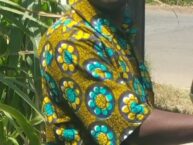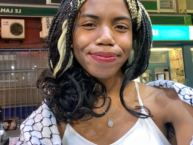 Mwinji Siame holds a Bachelor of Social Sciences in International Relations (Honours) from the University of Cape Town. She was born in Zambia but has lived in South Africa for the last sixteen years. Prominent themes in her fictional work include gender, violence and migration. When she is not reading or writing, Mwinji enjoys listening to music and plays the acoustic guitar.
Mwinji Siame holds a Bachelor of Social Sciences in International Relations (Honours) from the University of Cape Town. She was born in Zambia but has lived in South Africa for the last sixteen years. Prominent themes in her fictional work include gender, violence and migration. When she is not reading or writing, Mwinji enjoys listening to music and plays the acoustic guitar.
It All Became Like Poetry
She watched the flames dance around the centre of the ditch – a pile of plastic bottles, paper and bones. Soon they would be nothing more than wisps of ash floating in the air and whirling to the ground, sinking towards their final resting place.
She wondered what would happen when there was nothing left to burn. Would the heat engorge the earth, the roots of the old baobab and acacia that bound the soil? For the past four weeks she had found herself wandering in an almost trance-like state, thinking of where she would go and where things travelled to when they died.
The cross she once wore on her neck now lay on her bedside table because in a place like this, she could not believe that God could persist or even exist.
Chiko surveyed the plumes of smoke as they rose into the air, tracing their genesis into billowing clouds. She coughed a deep and gruff cough that tore through the silence and as she heard her own voice she jolted, stunned. Turning back towards the house, in anticipation of its emptiness, a cold reminder of the months before, she hesitated.
The lounge where he had sat, waving his jaunty arms like a flailing thing giving sermons with unduly long analogies and praying in idioms was now a shrine with photos hung recklessly and ornaments glistening even in the dimming light. The house was musky, dusty, its walls brown with filth. She would scrub the floors vigorously, pouring bleach onto the plastic tiles meanly, and wiping her brow. Then she would sweep the carpets, pulling the furniture aside then putting it back precisely where it had been.
To clean where they once stood was to sanctify what was now hallowed ground, but to touch the places where their hands had been, and their bodies had rested and laid, was to destroy their promise. They had lived together in the house, their arms and hands, and bodies, entangled, their stories now meshed together by a union they would never have dreamt of, worlds apart. They had lived together in that house and loved one another, and she could not wash that away.
She had tried since the day she came from the hospital. She had tried to wash him from her body, from her hair, her mouth, underneath her nails, between her toes, the ridge in her back where he had last held her. She had kneeled over his body but he had comforted her. She had rubbed soap into her hands over and over again, so that she might forget the memory of putting them over his chest, blood inking through his yellow, starched cotton shirt. She had tried so that she might forget how she threw her head back, half crying and half screaming for help as the men and women fled in all directions.
She sat on the edge of her bed now, unbuttoning her blouse, looking down at her bare chest and feeling around her neck where the chain had once rested, the gold cold against her skin. She had grown accustomed to playing with it nervously or tugging at the crucifix as she closed her eyes muttering prayers, praises and pleas for help.
When she had found him, slumped half in the road and half on the pavement like a sack of potatoes, she had knelt immediately, and began those same prayers. “Oh god, just keep him alive, just keep him alive, oh God, my God”, she chanted, breathlessly, as she watched his chest rise and fall slowly, then rapidly, then slowly again. She had wished it was her instead.
She wished she had stayed behind at lunch and he would have gone to get the order. He would have walked into the store humming as he usually did, the rolls of fabric on his shoulder, with his contorted to accommodate them. She should have been the one caught in the deluge of men and women fleeing stalls and shops as police drew their weapons and held back, while others charged forward with batons. Hers should have been one of the bodies that fell, almost gracefully, first to their knees then flat on the ground, conceding to bullets and batons, or buckling under the edge of cold metal pressing into their backs.
It was strange for her to see them strewn between fruits and vegetables, old leather court shoes, handbags and radios. Bodies limp and weak belonged slumped against walls in the taverns where men drank until they passed out, reeking of alcohol and bleeding from brawls. They belonged in overcrowded hospitals, in rickety iron beds, on yellowing sheets. The smell of charred flesh mingled with roasted maize and groundnuts, and fresh fish, filled her nostrils and made her sick. She had wiped her mouth with the square white handkerchief and carried on as if nothing had happened, as though she had not seen two mangled bodies, one slashed at the throat. She had continued to search for her husband, the midday sun lashing against her back so that she fell from time to time but wrestled her way up again. She stumbled until she saw a sign that read “Special Luxury Watches”, and a body not too far off. Something had drawn her there. It could have been anyone but the bright yellow shirt, the hands reaching out to the sky as if welcoming whatever was to come, stirred her .The feeling flung her to his side, and everything else meant nothing but still, it all became like poetry. That day, the things she had seen and heard, had said and wanted to say but kept inside, they all became signs, filled with meaning. His body lying there was full of meaning, tinged with bitter regret, with love, with pain.
Thinking back to that day, the slithers of smoke ascending from the burning ditch began to look like ghosts. Her world became like poetry, burning all around her.




3 comments for “It All Became Like Poetry by Mwinji Siame”